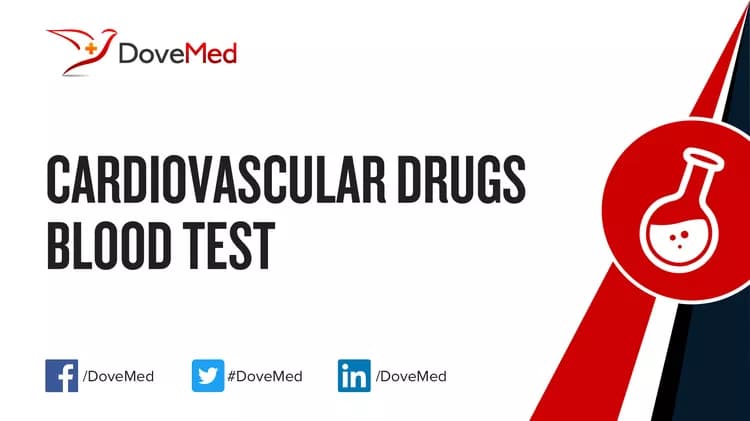What are other Names for this Test? (Equivalent Terms)
- Cardiovascular Drug Levels Blood Test
- Cardiovascular Medications Blood Test
What is the Cardiovascular Drugs Blood Test? (Background Information)
- Cardiovascular drugs are used to treat disorders of the heart and blood vessels. They are grouped into antiarrhythmics, anticoagulants, and antihypertensives, also called blood pressure medications
- Antiarrhythmic drugs make disordered heart beat patterns back to normal. They may stabilize electrical activity by regulating the flow of electrolytes across heart cell membranes. Or, they act on the nervous system to balance the impulses that control heart rhythm. Antiarrhythmic drugs are classified based on their mode of action. Common examples include quinidine, lidocaine, and phenytoin
- Anticoagulant medications prevent the formation of blood clots. They are commonly called “blood thinners.” However, anticoagulant medications do not actually affect the thickness of blood. The most commonly prescribed anticoagulant medication is warfarin. It is also known as Coumadin, among other trade names
- Warfarin works by halting the production of clotting factors. Clotting factors are proteins that help form blood clots at the site of blood vessel injury. A blood clot stops blood loss and allows the blood vessel to continue functioning
- Antihypertensives are cardiovascular drugs that decrease blood pressure. They are intended to prevent complications of high blood pressure, which include stroke, coronary heart disease (CHD), and heart failure. The most common antihypertensives include calcium channel blockers (CCBs), ACE inhibitors, and beta-blockers
- CCBs prevent the uptake of calcium ions (Ca2+) by muscle cells of the heart and arteries. This causes the heart to beat less forcefully and the arteries to widen, which decrease the blood pressure
- ACE (angiotensin-converting enzyme) inhibitors inhibit ACE and prevent the formation of angiotensin II. Angiotensin II is a hormone that raises blood pressure by narrowing blood vessels and other effects
- Beta-blockers bind to and deactivate beta-receptors on muscle cells of the heart and arteries. Beta-receptors allow for adrenaline and other stress hormones to stimulate these cells, increasing the force of heart contractions and narrowing blood vessels
- When deactivated by beta-blockers, beta-receptors are unable to initiate the stress response within heart and blood vessel muscle cells. This leads to a decrease in blood pressure
- Like other drugs, cardiovascular drugs must be kept within a certain range to prevent unwanted side effects. If the levels are too high, toxicity may result; if the levels are too low, cardiovascular drugs may not treat heart and blood vessel disorders
- The Cardiovascular Drugs Blood Test helps determine the levels of cardiovascular drugs in blood. It is used when adjusting the initial dose, and to ensure that cardiovascular drug levels stay within an acceptable range
What are the Clinical Indications for performing the Cardiovascular Drugs Blood Test?
The clinical indications for performing the Cardiovascular Drugs Blood Test include monitoring antiarrhythmic, anticoagulant, or antihypertensive therapy.
How is the Specimen collected for the Cardiovascular Drugs Blood Test?
Following is the specimen collection process for Cardiovascular Drugs Blood Test:
Sample required: Blood
Process of obtaining blood sample in adults:
- A band is wrapped around the arm, 3-4 inches above the collection site (superficial vein that lies within the elbow pit)
- The site is cleaned with 70% alcohol in an outward spiral, away from the zone of needle insertion
- The needle cap is removed and is held in line with the vein, pulling the skin tight
- With a small and quick thrust, the vein is penetrated using the needle
- The required amount of blood sample is collected by pulling the plunger of the syringe out slowly
- The wrap band is removed, gauze is placed on the collection site, and the needle is removed
- The blood is immediately transferred into the blood container, which has the appropriate preservative/clot activator/anti-coagulant
- The syringe and the needle are disposed into the appropriate “sharp container” for safe and hygienic disposal
Preparation required: No special preparation is needed prior to the test.
What is the Significance of the Cardiovascular Drugs Blood Test Result?
A high Cardiovascular Drugs Blood Test value may indicate cardiovascular medication toxicity, which is marked by:
- Lower back pain
- Fatigue
- Nausea
- Vomiting
- Diarrhea
- Altered mental status
- Abnormal heart rate
- Abnormal breathing
The laboratory test results are NOT to be interpreted as results of a "stand-alone" test. The test results have to be interpreted after correlating with suitable clinical findings and additional supplemental tests/information. Your healthcare providers will explain the meaning of your tests results, based on the overall clinical scenario.
Additional and Relevant Useful Information:
- Certain antihypertensive medications are merely diuretics. By increasing the rate of excretion of fluids, they decrease the volume of blood and lower blood pressure
Certain medications that you may be currently taking may influence the outcome of the test. Hence, it is important to inform your healthcare provider of the complete list of medications (including any herbal supplements) you are currently taking. This will help the healthcare provider interpret your test results more accurately and avoid unnecessary chances of a misdiagnosis.
The following DoveMed website links are useful resources for additional information:
https://www.dovemed.com/common-procedures/procedures-laboratory/digoxin-blood-test/
https://www.dovemed.com/diseases-conditions/hypertension/
Please visit our Laboratory Procedures Center for more physician-approved health information:
http://www.dovemed.com/common-procedures/procedures-laboratory/
Related Articles
Test Your Knowledge
Asked by users
Related Centers
Related Specialties
Related Physicians
Related Procedures
Related Resources
Join DoveHubs
and connect with fellow professionals


0 Comments
Please log in to post a comment.